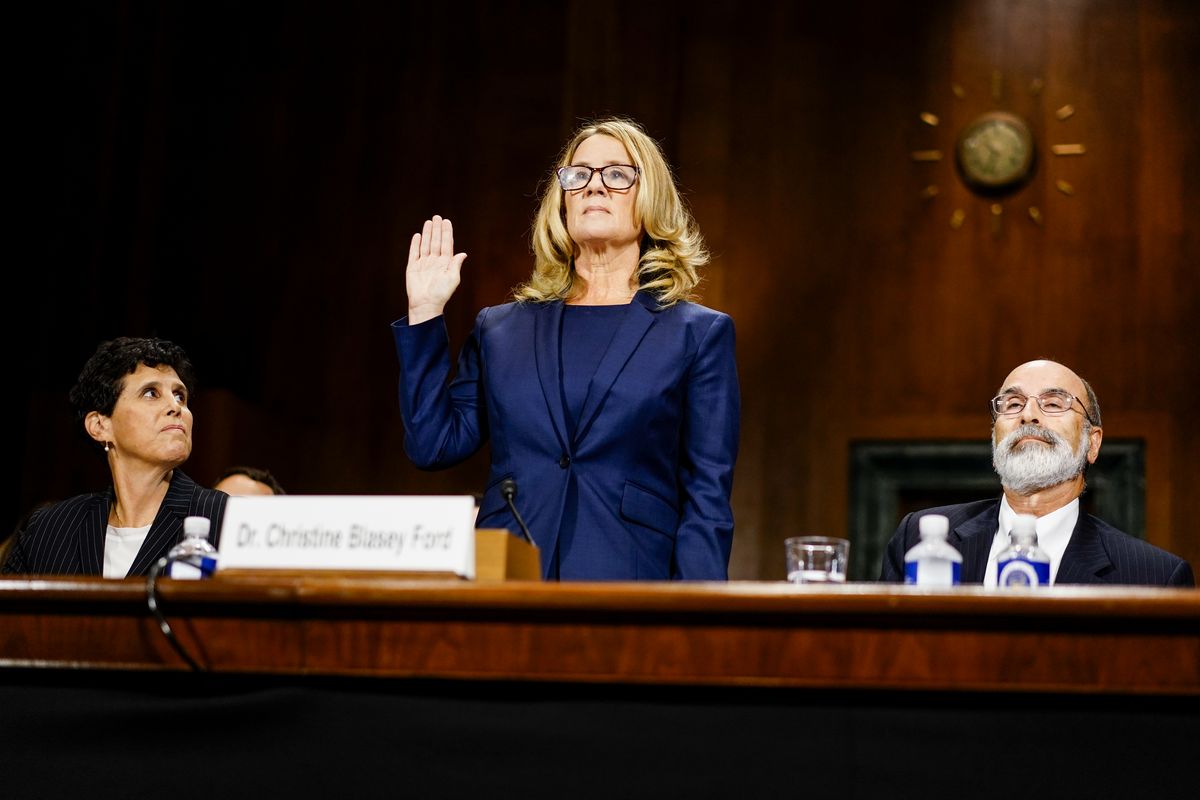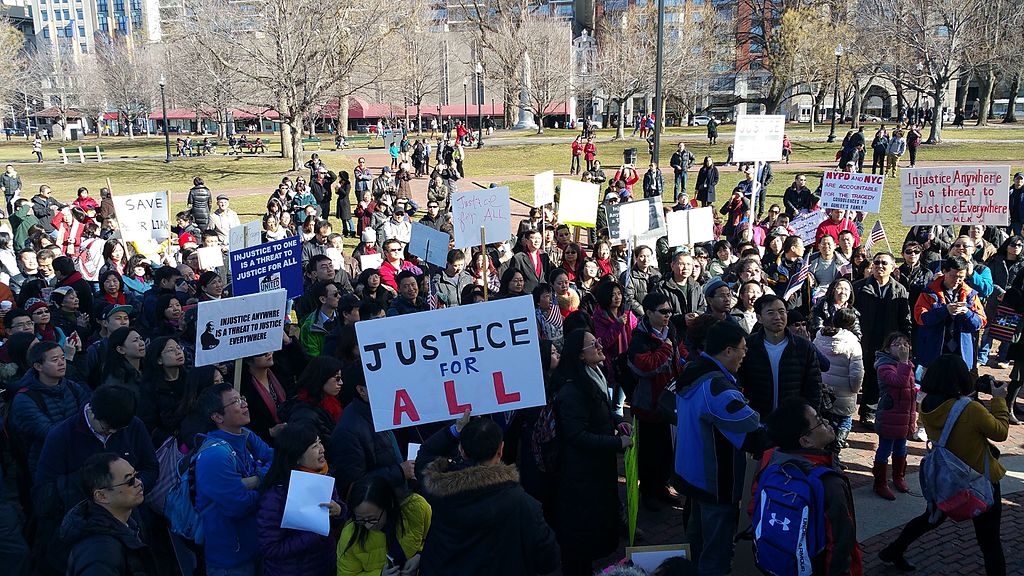Katia Santiago-Taylor wore a tailored suit and high heels but her demeanor was warm and inviting, much like the couch-filled conference room in which we sat.
Santiago-Taylor is the Advocacy and Legislative Affairs Manager at the Cambridge-based Boston Area Rape Crisis Center (BARCC). Originally from Puerto Rico, she has previously worked at the Massachusetts Office for Victim Assistance and Suffolk County District Attorney’s Office. She helped provide support services to victims and witnesses of crimes, including homicide, in her previous positions.
At the time of the interview, a week after Brett Kavanaugh’s judiciary hearing, Santiago-Taylor said BARCC was inundated with calls from survivors and volunteers. In September, Christine Blasey Ford’s accusation against then Supreme Court nominee Brett Kavanaugh of drunkenly sexually assaulting her at a party when she was 15 went public.[1] Kavanaugh denied the accusation, suggesting that Ford could not be sure that he was the man who assaulted her.[2] On September 27th, the Senate Judiciary Committee listened to both Blasey Ford and Kavanaugh to assess their credibility and ultimately decide if Kavanaugh was fit for the job.[3] Their emotional testimonies garnered sympathy and criticism, sparking a national conversation about sexual assault.
“Fifty-eight percent of survivors think they’re going to die,” said Santiago-Taylor, comparing the gravity of sexual assault to her time working with people affected by homicide. “Sexual assault is extremely traumatizing and changes people’s lives forever.”
I spoke with Santiago-Taylor about the Kavanaugh hearing, its impact on BARCC, and how to support victims of sexual assault.
IA: Have you seen an influx of new people coming into BARCC since the Kavanaugh case made headlines?
KST: Our hotline has increased, the request for people to speak to has increased. It seems like we don’t have a break. A normal reaction to sexual violence is to be triggered by comments, and not a day goes by without a mention.
IA: Have there been other high-profile cases in the news that brought a similar reaction?
KST: It has been mounting up. The more it happens, the more survivors speak up. It’s not like R. Kelly happens and it’s a surge. It seems survivors are feeling [like they are] in a better place to speak up. They say, “Okay, now I’m empowered.”
IA: Do you think the reaction to these cases can prevent people from speaking up?
KST: I think so. Some reasons why people don’t speak up is because they won’t be believed. They’ll be called liars. I hope that the reaction of the broader community supporting survivors will have a longer impact than the words of the perpetrators.
IA: Speaking of perpetrators, what did Brett Kavanaugh get wrong in his testimony last week?
KST: I don’t think he got anything right. It was a job interview—how many places of employment will move forward when someone’s accused [of sexual assault]? Furthermore, why would a place hire someone who spoke to employers the way he did? It’s not an issue of political parties, it’s an issue of his behavior.
IA: What did the media get wrong when covering the case?
KST: As a form of self-care, I’m not following it. There are comments made that are victim blaming. I heard a lot of people saying “innocent until proven guilty.” Why can’t we just say, “I believe her?” Why can’t we not question her?
IA: Did they get anything right?
KST: There’s awareness. The two women confronting [Senator Jeff] Flake gave voices to survivors. Survivors can be triggered at any point. Let them speak. Let them be heard.
IA: How can people help give a voice to survivors?
KST: One of the things we do at BARCC is we don’t force anyone to relive details. Survivors will remember what happened no matter what. Giving them a space to talk about where they are and what they want can be very empowering.
IA: How can a prosecutor go about addressing a victim in a sexual assault case without making them relive the details?
KST: It’s about how a victim is treated and if they’re believed and respected. The outcome doesn’t matter as much as what [the victim] feels. It’s the way the question is asked and how the survivor felt.
IA: How successful was the prosecutor in the Kavanaugh case in doing so?
KST: I’m not so sure she did her job. Her role was to ask questions, not to be a prosecutor. I hope that’s not what she’s like in court or law. A director of [human resources] could have done a better job.
IA: When the ones directly involved in the case aren’t helping, how can an outsider help support victims?
KST: Think about all of the angles. We can’t keep mounting survivors against survivors. Not all survivors are one. We’re all different.
IA: Are your resources strained?
KST: Requests for services are continuing to increase. We’re definitely tapped out. We’re busy all the time. Our priority is direct client service, so we can’t do other work we want to do.
IA: Are men coming too?
KST: Women are coming at higher rates. [The media] talks about it as a women’s issue, but non-binary people and trans women are non-proportionally assaulted. BARCC provides services to all people. The media focuses on women; men and non-binary people are being left out.
Men are coming forward slowly, but they’re coming forward. We need to be better bystanders. It’s about how we frame to them that it’s okay.
IA: Although men are coming forward, many of them are the perpetrators. Is there a way for them to apologize in a non-problematic way?
KST: If it’s something the survivor is looking for. It’s not “I’m sorry I hurt you” or “I’m sorry I got caught.” It’s “I’m sorry I did this and I’ll never do it again.” Frame it to empower the survivor. Not all survivors are looking for an apology. It’s not for everyone. We should look further into restorative justice, the concept of a perpetrator owning their behavior and working with the survivor.
IA: Can an abuser grow from past actions?
KST: I would like to think so. Statistics say that rapists commit multiple rapes. I like to think that if they were called out, they wouldn’t commit another.
IA: How can we move forward from here?
KST: Create better policies and laws. Allocating financial resources to continue supporting survivors. [The resources go to] places like BARCC and shelters. The more people we have, the better the services will be. [Volunteers] have a significant commitment. They do hotline work as our request for other services continues to increase. We’re here for survivors. It doesn’t matter when, we’ll meet you where you are.
BARCC’s 24-hour hotline is 800-841-8371. More information is available at barcc.org.
[1] Brown, Emma. “California Professor, writer of confidential Brett Kavanaugh letter, speaks out about her allegation of sexual assault.” Washington Post. September 16, 2018. https://www.washingtonpost.com/investigations/california-professor-writer-of-confidential-brett-kavanaugh-letter-speaks-out-about-her-allegation-of-sexual-assault/2018/09/16/46982194-b846-11e8-94eb-3bd52dfe917b_story.html?utm_term=.d2eb5190efaf
[2] Watkins, Eli. “Kavanaugh denies two additional accusations to Senate Judiciary Committee.” CNN. September 28, 2018. https://www.cnn.com/2018/09/26/politics/brett-kavanaugh-allegations/index.html
[3] Cummings, William. “Christine Ford accepts Senate invitation to testify on Kavanaugh allegation Thursday.” USA Today. September 23, 2018. https://www.usatoday.com/story/news/politics/2018/09/23/brett-kavanaugh-hearings-christine-ford-accepts-senate-invitation/1404028002/



